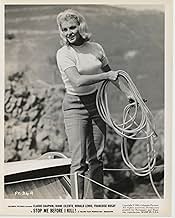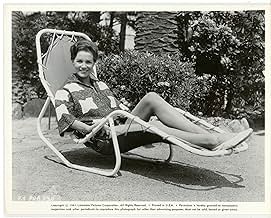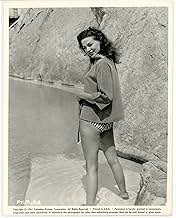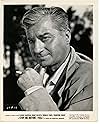IMDb RATING
6.0/10
1.1K
YOUR RATING
After surviving a traumatic car accident, a race car driver travels to the Cote D'Azur to recover but is plagued by an urge to strangle his wife.After surviving a traumatic car accident, a race car driver travels to the Cote D'Azur to recover but is plagued by an urge to strangle his wife.After surviving a traumatic car accident, a race car driver travels to the Cote D'Azur to recover but is plagued by an urge to strangle his wife.
Françoise Rosay
- Madame Prade
- (as Francoise Rosay)
Andre Charisse
- Waiter at Villa
- (uncredited)
Roy Everson
- Onlooker at London Crash
- (uncredited)
Aileen Lewis
- Onlooker at Crash
- (uncredited)
Dickie Owen
- London Taxi Driver
- (uncredited)
Featured reviews
Obscure Hammer Psychological Thriller Written and Directed by Val Guest.
Suffering a Head Injury resulting from a Car Crash, a Race Car Driver (Ronald Lewis) Cannot Perform on His Honeymoon and on top or that is Haunted by a Lust to Kill His New Bride (Diane Cilento).
He has Black Outs and is Forever Fighting the Urge, and eventually seeks a Psychiatrist (Claude Dauphin), a Friend of His New Bride.
1960 saw a Trend in "Psycho" Pictures and Hammer joined in Immediately. This being a Val Guest Film there are a Number of Interesting Camera Flourishes and is a Fun Film to Watch.
But the Fun is Interrupted Frequently by Repetitive Scenes and some Mysterious Things that Astute Viewers won't find that Mysterious.
Good Acting from the International Cast but They bring Heavy Accents to the Dialog, and there is a Lot of Dialog, and it can become Wearisome. The Extended Length (107-120 min depending) Doesn't Help as the Story tends to Lumber and Stretch the Plot beyond its B-Movie Capacity to Sustain.
Overall, Worth a Watch, but Ultimately Talky, Heavy Handed and the Constant Changing Tone that is a Result of the Protagonist's Confusion and the Fighting and Making Up, Fighting and Making Up, becomes Tedious. It's Burdensome at times and tends to make the Movie more Irritating than Intriguing.
Suffering a Head Injury resulting from a Car Crash, a Race Car Driver (Ronald Lewis) Cannot Perform on His Honeymoon and on top or that is Haunted by a Lust to Kill His New Bride (Diane Cilento).
He has Black Outs and is Forever Fighting the Urge, and eventually seeks a Psychiatrist (Claude Dauphin), a Friend of His New Bride.
1960 saw a Trend in "Psycho" Pictures and Hammer joined in Immediately. This being a Val Guest Film there are a Number of Interesting Camera Flourishes and is a Fun Film to Watch.
But the Fun is Interrupted Frequently by Repetitive Scenes and some Mysterious Things that Astute Viewers won't find that Mysterious.
Good Acting from the International Cast but They bring Heavy Accents to the Dialog, and there is a Lot of Dialog, and it can become Wearisome. The Extended Length (107-120 min depending) Doesn't Help as the Story tends to Lumber and Stretch the Plot beyond its B-Movie Capacity to Sustain.
Overall, Worth a Watch, but Ultimately Talky, Heavy Handed and the Constant Changing Tone that is a Result of the Protagonist's Confusion and the Fighting and Making Up, Fighting and Making Up, becomes Tedious. It's Burdensome at times and tends to make the Movie more Irritating than Intriguing.
Before addressing the acting, which I regard as uniformly superb throughout, I should add my agreement with several other reviewers that there are several scenes in this film that are simply repetitive, so that it might have been more effective with about 15 or 20 minutes cut out of it. However, it is still highly effective as is, due to the acting of four of the five principals, those being Diane Cilento, Ronald Lewis, Claude Dauphin and Bernard Braden. The fifth, the damned-near immortal Francoise Rosay is fine, but really contributes little to the film from an acting standpoint; she simply has little to do and nothing to act. It's the kind of role that in an American film would have been given to Argentina Brunetti or Celia Lovsky!
I'd never heard of this movie before - surprisingly, since I am a devotee of British film and acting from all periods and because this is, at least in the three leading roles, an impressive cast listing. I thought Cilento's accent was just fine throughout (if I didn't know her from anything else, I would never have thought of her as coming from Down Under); to me, it sounded Italian, but she uses a lot of French phrases and speaks French to others (the film takes place in France and England), so maybe that has confused other reviewers. The character's first name, "Denise", certainly sounds French rather than Italian, but that doesn't mean too much in a world where we have a noted Irish operatic baritone named Bruno Caproni! As with everything I've ever seen her in, Cilento is wonderful throughout, and very sexy in both voice and aspect. She beautifully captures both the character's love for, and fright of, her seemingly demented husband. Claude Dauphin was a pretty famous actor on both sides of the Atlantic at this time, and this is by far the best outing I have seen from him in an English-language film. I used to find him fairly hard to understand in our language, but not so in this one - and he has some really difficult dialogue (lots of it, and much of it replete with scientific jargon) to get through. He captures the psychiatrist's intelligence, egotism and kindness throughout, yet we are aware that there may be more to him than he shows on the surface. As for Ronald Lewis, I could never understand why he never became anything like an international star. He was a very good actor, with a resonant voice and wide emotional range, both very handsome and very macho (like good old George O'Brien, somebody always got him to remove his shirt in the course of a movie), and quite volatile as both villains and heroes - kind of like a visual and emotive cross between Stephen Boyd and Kirk Douglas. (This may have carried over to his personal life, as he did commit suicide when only 53.) Anyway, this is a very difficult role to play convincingly and he does it about as well as can be imagined (in fact, in this film he really did remind me of Stephen Boyd). A bit of a surprise is Bernard Braden, a Canadian actor with whom I was almost totally unfamiliar, but who plays an old friend of Lewis's who is about the only completely normal character in the film (Cilento is lovable, but hardly normal, unless one considers going to bed with someone you know may strangle you in the middle of the night to be normal), but he plays him extremely well and with a kind of of Everyman quality and lack of flair. Rosay, as I already said, is wasted here, but her English is actually less accented than is Dauphin's, perhaps reminding us that this most quintessentially French of French actresses did appear in a good number of English-language films during her long career.
With a few outdoor scenes deleted, this film could almost serve as a play for three major acting talents, so it is a bit 'talky', but the talk is pretty solid. Anyway, there is lots of emotional excess here and the actors are really up to it, and despite its overlong process in reaching a somewhat surprising, if well thought out, denouement, it maintains and builds interest and suspense throughout. It probably deserves a 6 rating, but being performance oriented, I give it an 8. If you enjoy watching good actors act, this is a film for you. Suspend your disbelief and just enjoy it.
I'd never heard of this movie before - surprisingly, since I am a devotee of British film and acting from all periods and because this is, at least in the three leading roles, an impressive cast listing. I thought Cilento's accent was just fine throughout (if I didn't know her from anything else, I would never have thought of her as coming from Down Under); to me, it sounded Italian, but she uses a lot of French phrases and speaks French to others (the film takes place in France and England), so maybe that has confused other reviewers. The character's first name, "Denise", certainly sounds French rather than Italian, but that doesn't mean too much in a world where we have a noted Irish operatic baritone named Bruno Caproni! As with everything I've ever seen her in, Cilento is wonderful throughout, and very sexy in both voice and aspect. She beautifully captures both the character's love for, and fright of, her seemingly demented husband. Claude Dauphin was a pretty famous actor on both sides of the Atlantic at this time, and this is by far the best outing I have seen from him in an English-language film. I used to find him fairly hard to understand in our language, but not so in this one - and he has some really difficult dialogue (lots of it, and much of it replete with scientific jargon) to get through. He captures the psychiatrist's intelligence, egotism and kindness throughout, yet we are aware that there may be more to him than he shows on the surface. As for Ronald Lewis, I could never understand why he never became anything like an international star. He was a very good actor, with a resonant voice and wide emotional range, both very handsome and very macho (like good old George O'Brien, somebody always got him to remove his shirt in the course of a movie), and quite volatile as both villains and heroes - kind of like a visual and emotive cross between Stephen Boyd and Kirk Douglas. (This may have carried over to his personal life, as he did commit suicide when only 53.) Anyway, this is a very difficult role to play convincingly and he does it about as well as can be imagined (in fact, in this film he really did remind me of Stephen Boyd). A bit of a surprise is Bernard Braden, a Canadian actor with whom I was almost totally unfamiliar, but who plays an old friend of Lewis's who is about the only completely normal character in the film (Cilento is lovable, but hardly normal, unless one considers going to bed with someone you know may strangle you in the middle of the night to be normal), but he plays him extremely well and with a kind of of Everyman quality and lack of flair. Rosay, as I already said, is wasted here, but her English is actually less accented than is Dauphin's, perhaps reminding us that this most quintessentially French of French actresses did appear in a good number of English-language films during her long career.
With a few outdoor scenes deleted, this film could almost serve as a play for three major acting talents, so it is a bit 'talky', but the talk is pretty solid. Anyway, there is lots of emotional excess here and the actors are really up to it, and despite its overlong process in reaching a somewhat surprising, if well thought out, denouement, it maintains and builds interest and suspense throughout. It probably deserves a 6 rating, but being performance oriented, I give it an 8. If you enjoy watching good actors act, this is a film for you. Suspend your disbelief and just enjoy it.
"Stop Me Before I Kill" or "The Full Treatment" is a 1960 film with a screenplay by Val Guest, who also directed.
The story concerns a famous race car driver, Alan Colby (Ronald Lewis), who was involved in a terrible car crash with his wife Denise (Diane Cilento). He is unable to race, and he and Denise go to the south of France on vacation.
Alan goes through swift mood shifts - the slightest word can set off his temper. And he keeps being tempted to strangle his wife - in fact, he nearly does a couple of times.
This, of course, is where one has to suspend belief because why the heck would she stay with someone who has attempted to strangle her and whose temper flares at the drop of a hat? I understand women in abusive situations, but I don't know, my husband trying to kill me takes it to a new level.
A psychiatrist they meet, Dr. David Prade (Claude Dauphin) offers to help. Alan is hesitant, but once back in London, where Prade has also returned, he agrees. At the end of the treatment, he feels that he is cured. He is able to get back on the racing track and has no temptation to hurt Denise.
Right before he is to leave for a race, Alan wakes up and finds that Denise is not there. In fact, all the evidence points to the fact that she has been murdered.
This was a very good story that suffered from an unbalanced script. The film went on too long, and the psychiatric scenes were endless. Diane Cilento is a beautiful and heartfelt Denise, Claude Dauphin is likable, and Ronald Lewis for me lacked subtlety in a difficult role. A good-looking man, in the beginning of the film, he reminded me of David Hasselhoff; fortunately, the resemblance faded somewhat.
Sadly Ronald Lewis committed suicide in 1982, bankrupt and his career in the doldrums.
In other hands and a bigger budget, this could have been an excellent film. However it's worth seeing for the story.
The story concerns a famous race car driver, Alan Colby (Ronald Lewis), who was involved in a terrible car crash with his wife Denise (Diane Cilento). He is unable to race, and he and Denise go to the south of France on vacation.
Alan goes through swift mood shifts - the slightest word can set off his temper. And he keeps being tempted to strangle his wife - in fact, he nearly does a couple of times.
This, of course, is where one has to suspend belief because why the heck would she stay with someone who has attempted to strangle her and whose temper flares at the drop of a hat? I understand women in abusive situations, but I don't know, my husband trying to kill me takes it to a new level.
A psychiatrist they meet, Dr. David Prade (Claude Dauphin) offers to help. Alan is hesitant, but once back in London, where Prade has also returned, he agrees. At the end of the treatment, he feels that he is cured. He is able to get back on the racing track and has no temptation to hurt Denise.
Right before he is to leave for a race, Alan wakes up and finds that Denise is not there. In fact, all the evidence points to the fact that she has been murdered.
This was a very good story that suffered from an unbalanced script. The film went on too long, and the psychiatric scenes were endless. Diane Cilento is a beautiful and heartfelt Denise, Claude Dauphin is likable, and Ronald Lewis for me lacked subtlety in a difficult role. A good-looking man, in the beginning of the film, he reminded me of David Hasselhoff; fortunately, the resemblance faded somewhat.
Sadly Ronald Lewis committed suicide in 1982, bankrupt and his career in the doldrums.
In other hands and a bigger budget, this could have been an excellent film. However it's worth seeing for the story.
At 108 minutes, the Hammer production "Stop Me Before I Kill!" is one of the longest movies that they made. It's a rather meaty story, and serves as a major showcase for three of its main actors, but isn't that satisfying overall. Written by producer & director Val Guest and author Ronald Scott Thorn, based on the latters' novel "The Full Treatment", it tells of a British race car driver, Alan Colby (Ronald Lewis), and his lovely Italian wife Denise (Diane Cilento), vacationing in France some time after a bad traffic accident in which the other driver had died. Alan fears for his sanity, and is now worried that he may have developed homicidal intentions towards his wife. They make the acquaintance of an eminent French psychiatrist, David Prade (Claude Dauphin), who attempts to help Alan deal with his issues.
This could and should have been a little more involving, as the premise is not bad and it's entertaining enough in watching psychiatric methods being employed. But the script by Guest and Thorn is so heavily laden with dialogue that it barely gives the story (not to mention the actors) a chance to breathe. It does have some good dialogue, and starts to go for more interesting visuals in its final third. The on location shooting, of course, is impeccable, which, along with the Megascope photography, helps to make the picture pleasant enough to look at. (To say nothing of sexy blonde Cilento). Dauphin, Cilento, and Lewis are all fine, and they're ably supported by Francoise Rosay as Prades' mother, and Bernard Braden as Colby's friend Harry. The filmmaking is pretty slick; it's just too bad that the scenario can't generate more suspense.
Certainly worth a look for devoted Hammer followers, but not one of their best.
Six out of 10.
This could and should have been a little more involving, as the premise is not bad and it's entertaining enough in watching psychiatric methods being employed. But the script by Guest and Thorn is so heavily laden with dialogue that it barely gives the story (not to mention the actors) a chance to breathe. It does have some good dialogue, and starts to go for more interesting visuals in its final third. The on location shooting, of course, is impeccable, which, along with the Megascope photography, helps to make the picture pleasant enough to look at. (To say nothing of sexy blonde Cilento). Dauphin, Cilento, and Lewis are all fine, and they're ably supported by Francoise Rosay as Prades' mother, and Bernard Braden as Colby's friend Harry. The filmmaking is pretty slick; it's just too bad that the scenario can't generate more suspense.
Certainly worth a look for devoted Hammer followers, but not one of their best.
Six out of 10.
Race car driver Ronald Lewis was in a road accident with his French wife, Diane Cilentro; the driver of the truck involved was killed, and Lewis was injured. A year later, he is recovered enough to go to the Riviera with his wife. But he has changed emotionally. He's subject to sudden bursts of jealous anger and fantasies about strangling his wife. So when she is pleasant with psychiatrist Claude Dauphin, the fits come on. When they return to London, the cycle continues until Miss Cilento persuades Lewis to see Dauphin professionally.
Miss Cilento is always worth watching, and it's not solely because of her great beauty. It's Lewis who shines. He's quite believable as a man who can and and does turn violent over seeming trifles. I must admit that 110 minutes seemed to go on too long, and I thought the movie might have been cut a little closer; I was considering fast-forwarding three a bit of it at the 70-minute mark. I didn't, and figured out what was going to happen instead.
Director-coscripter Val Guest was better known for works like CONFESSIONS OF A WINDOW CLEANER and MR. DRAKE'S DUCK than psychological thrillers, so it wasn't surprising to me when this veered off into melodrama. Still, it's a nicely complicated little plot, and the lead trio are fine actors, making this a very pleasant movie.
Miss Cilento is always worth watching, and it's not solely because of her great beauty. It's Lewis who shines. He's quite believable as a man who can and and does turn violent over seeming trifles. I must admit that 110 minutes seemed to go on too long, and I thought the movie might have been cut a little closer; I was considering fast-forwarding three a bit of it at the 70-minute mark. I didn't, and figured out what was going to happen instead.
Director-coscripter Val Guest was better known for works like CONFESSIONS OF A WINDOW CLEANER and MR. DRAKE'S DUCK than psychological thrillers, so it wasn't surprising to me when this veered off into melodrama. Still, it's a nicely complicated little plot, and the lead trio are fine actors, making this a very pleasant movie.
Did you know
- TriviaSean Connery visited the set during filming in the South of France. He was dating Diane Cilento at the time. They married the following year.
- GoofsNear the beginning of the film, after Alan successfully passes the truck and pulls over to the side of the road, he leaps out of the car without setting the parking brake. Denise is seen pulling on the handbrake, but the car continues to move until the end of the shot, with the front of the car going past the roadside sign. In the next shot, the car has been moved back so that its front is even with the sign.
- Quotes
David Prade: You know, only the unsuccessful murderers disclose their crimes.
Alan Colby: And the successful ones?
David Prade: Well, they draw their reward from a feeling of personal power.
- Alternate versionsColumbia cut the film to 93 min when they released it in the US, but the TV arm of Columbia, Screen Gems, syndicated a toned down 107 min. print to US television for years.
- ConnectionsReferenced in DVD/Lazerdisc/VHS collection 2016 (2016)
- How long is Stop Me Before I Kill!?Powered by Alexa
Details
- Release date
- Country of origin
- Languages
- Also known as
- Obsesión diabólica
- Filming locations
- Albert Embankment, Lambeth, London, England, UK(Ronald and Diane's London apartment)
- Production companies
- See more company credits at IMDbPro
- Runtime
- 1h 48m(108 min)
- Color
- Aspect ratio
- 2.35 : 1
Contribute to this page
Suggest an edit or add missing content
































